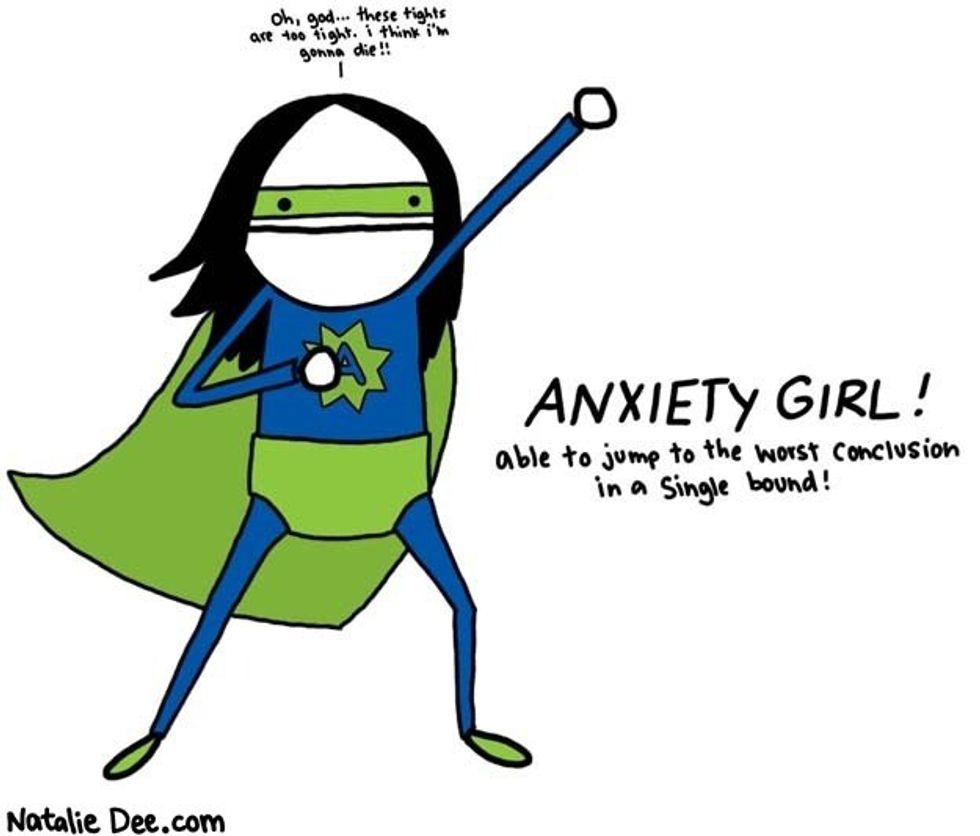“Anxiety's like a rocking chair. It gives you something to do, but it doesn't get you very far.” ~ Jodi Picoult, "Sing You Home"
Like any other disorder or condition, anxiety isn’t pleasant. When you experience anxiety or are diagnosed with an anxiety disorder, you have to modify your life completely. Anxiety is an emotion and is present when one feels tension, worrisome thoughts or even some physical changes like increased blood pressure. People with anxiety experience this feeling on a day-to-day basis. They frequently have excessive and persistent worry and fear about everyday situations like homework and school, or even work-related situations.
Someone with an anxiety disorder may also experience panic attacks, which are sudden feelings of intense anxiety and fear. During a panic attack, anxiety will trigger the body’s “fight-or-flight” response which causes the body to develop a large amount of physical symptoms such as increase in heart rate, sweating, dizziness or headaches, shortness of breath, and even tremors or twitches.
Other than the physical symptoms of an anxiety disorder, there are emotional symptoms, as well. The emotional symptoms of anxiety are most often the first to begin in a panic attack and it’s typically to blame for the physical symptoms as well as feelings of apprehension or dread, trouble concentrating, feeling tense and jumpy, or even something as simple as anticipating the worst in a situation. Every person is different, though. What may trigger an attack for you may not do the same for me.
It is not uncommon to have an anxiety disorder. At least one in four people you meet will have an anxiety disorder. It is the most common mental illness in the United States, affecting over 40 million adults 18 and older. That’s 18 percent of the United States population. Another disorder that is commonly found with anxiety is depression. They go hand in hand and about half of the people diagnosed with depression are diagnosed with an anxiety disorder as well ("Facts & Statistics | Anxiety and Depression Association of America, ADAA").
Everyone experiences anxiety, whether it’s caused by a fear or even procrastinating on a 10-page paper. Although we all have anxiety from time to time, it’s important to see a doctor if your anxiety is constant and getting in the way of your personal life, because anxiety disorders may get worse if they go untreated. Each anxiety disorder has a different combination of symptoms, but they usually all include an irrational fear or dread.
Sometimes an anxiety disorder is extremely difficult to diagnosed because it could occur along with another mental disorder or physical illnesses, like alcohol and/or substance abuse, bipolar disorder and many more, and one’s anxiety may worsen if that’s the case ("NIMH- Anxiety Disorders"). To be diagnosed with an anxiety disorder, a careful diagnostic evaluation is conducted to determine whether one’s symptoms are caused by an anxiety disorder or a different problem. Once a person is diagnosed with anxiety, the doctor then identifies the type of anxiety disorder(s) the person may have. A person can suffer from multiple anxiety disorders ("NIMH- Anxiety Disorders"). After being diagnosed, the patient has a choice to receive treatment or continue with how they’ve already been coping.
Although anxiety disorders are highly treatable, only about one-third of the people diagnosed actually want and get treatment. Anxiety disorders can be treated with either medication, therapy or even both. For some reason some feel embarrassed to be treated for anxiety. It's not a physical disorder and know one would even know that you have it. Some people say that it's all in your head, but if that was the case, we could use our head to stop it, right?
Not everyone who suffers from an anxiety disorder experiences attacks -- however, I am one who does. Sometimes they're easy to contain and no one would even know that I'm experiencing one, however sometimes they can last for hours, and leave me involuntarily shaking. Everyone deals with these attacks differently. I have learned to swaddle myself in a blanket like you would a baby.
The cause of an anxiety disorder is unknown, but scientists believe it may have something to do with genetics, brain chemistry and/or major life events. They may also result from a combination of environmental, psychological, and developmental factors ("Facts & Statistics | Anxiety and Depression Association of America, ADAA").
Anxiety is usually something that is left unspoken. People who don't understand the disorder tend to make assumptions that the affected people are just "attention seekers," however it is a real medical disorder and should be addressed.

















